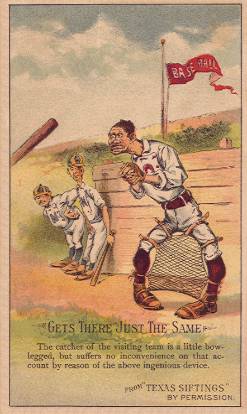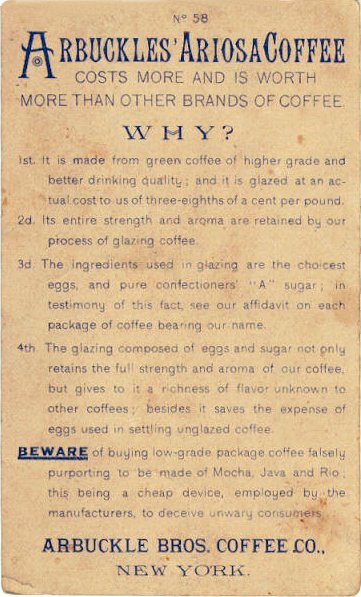3. Set Profiles: Arbuckle Coffee Trade Cards

from Arbuckle Satire Series (Card #58) |

Trade Card Back |
|
Along with its competitors McLaughlin and Gold Medal, Arbuckle Coffee was among the most prolific distributors of trade cards in the final decades of the 19th century. For several years around 1890, Arbuckle distributed more than a dozen sets that included many hundreds of cards.
Of these, only two cards contained references to baseball.
The "Gets There Just The Same" card shown at left was included in Part II of a 100-card set now referred to as the Satire Series. It was issued in late 1888 or early 1889.
The front of each card is a brightly colored illustration presenting satirical commentary in a cartoonish style. All cards display a humorous (or sometimes not so humerous by today's standards) text at the bottom of the card. The title and text below the cartoon on this card reads:
"GETS THERE JUST THE SAME"
The catcher of the visiting team is a little bow-
legged, but suffers no inconvenience on that ac-
count by reason of the above ingenious device.
FROM "TEXAS SIFTINGS"
BY PERMISSION.
The backs of cards in the Satire Series are printed in one of two styles. One (as in the example on the card above) contains the standard "Four Points" sales pitch, in a vertical format, explaining the four key virtues of Arbuckles' Ariosa Coffee. A second style, known for some cards in the series, shows a detailed engraving of the Arbuckle factory buildings and docks, in shades of blue in a horizontal format. However, this second back style has not been confirmed for the baseball-themed card (Card #58).
As seen at the top of the card back, it is "No. 58" in the series.
Interestingly, however, the baseball-themed card above did not originally appear in Texas Siftings as stated at the bottom of the card. Instead, it was published in the September 8, 1888 issue of Judge magazine (Vol. 14, No. 360). A clipping of the original Judge cartoon is shown at right.
The card back identifies the card as "No. 1" in the series and contains text promoting the company's Ariosa brand coffee and encouraging the user to "keep a small coffee-mill in your kitchen and grind your coffee just as you use it--one mess at a time."
Although baseball is perhaps down played in the graphics on the card front, it is more prominently featured in the text on the reverse. Under the title "United States," the right side of the card back contains the following narrative:
We are a cosmopolitan land, and as such, have attempted to take from all nations their best, rejecting what our judgments could not approve, and usually improving what we have taken. So it is with base-ball, the truly national game. This is the highest developement of which any form of playing with balls has thus far been found capable. It has taken something from football, from cricket, from hand-ball and evolved the most scientific game. In playing it well, every quality of the athlete comes into play.
Yachting is another national sport and every sheet of navigable water is covered with the fairy sails of pleasure craft. Our country holds the World's supremacy in yachting.
The circus is pre-eminently an American institution, universally in favor with the young and one may say the old. The name of P. T. Barnum is more potent to the imagination and calls up more pleasure than almost any other that may be suggested.
Fishing counts its American devotees by the thousands.
Canoeing, a very popular sport of to-day is an inheritance from the aboriginal Indians who fashioned them of birch bark.
Cycling is a diversion that counts its devotees by the million. In 1819, a machine was invented derisively called a hobby-horse, but the feet of the propeller rested on the ground. With the advent of the "cycle" and "safety" a revolution in outings has been accomplished.
Amateur photography is a fad that has come in of recent years, but it has come to stay. The camera fiend is abroad in the land, and there's little of note that he does not capture.
Many other sports and pastimes engage our juvenile population, not the least of which is the celebration of the national holiday by the display of fireworks.
In addition, a single line of text across the bottom of the card reads "This is one of a series of Fifty (50) Cards giving a pictorial History of the Sports and Pastimes of all Nations."
A comprehensive book entitled "Arbuckles' Ariosa Coffee Victorian Trade Cards" was recently released by Jeffrey Buck who provided some of the material for this article. The 318-page illustrated full-color book in 8-1/2 by 11-inch format can be ordered from Jeff's extensive website at www.arbycards.info.


